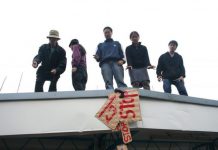Self-determination is also a key term for Youngspiration, another post-Occupy political party mainly supported by youngsters. But unlike Demosisto, Chu and Lau, Youngspiration advocates “national self-determination” rather than “democratic self-determination”. Joshua Wong says his party does not believe a restrictive nationalist framework is necessary to attaining self-determination and thinks Youngspiration fails to clearly define who would belong to a Hong Kong nation.
However, Youngspiration legislator Yau Wai-ching thinks it is necessary to stress Hong Kong’s separateness from the Mainland and to promote Hong Kong people’s identity and sense of belonging as a nation. She says Hong Kong’s future should be determined by those who are conscious of their Hong Kong identity.
“We are not just simply using a document to determine who can take part in the determination of Hong Kong’s future but by their ideology, whether they agree with Hong Kong’s values and are willing to contribute themselves,” Yau says.

She proposes that new immigrants from the Mainland and foreigners who settle in Hong Kong should pass a citizenship test – encompassing language ability, knowledge of Hong Kong history and culture and civic knowledge – to be eligible to join the Hong Kong nation.
On the Basic Law, both Demosisto and Youngspiration believe the mini-constitution and the Joint Declaration were drawn up without the mandate of Hong Kong people. Youngspiration’s Yau Wai-ching says it should be abolished.
Apart from their beliefs about the future of Hong Kong, Youngspiration has different views from Demosisto on issues like the June Fourth crackdown and the democratic movement in the Mainland. Demosisto supports the rehabilitation of those who took part in the protests. They see the incident as a part of Hong Kong local history and believe it is impossible to isolate Hong Kong’s politics from the Mainland’s geopolitical influence.
But Youngspiration’s Yau disagrees. “There is not even any democracy in Hong Kong. How come you’ll help establish a democratic China?”
Youngspiration worked with Hong Kong Indigenous (HKI) during the Legislative Council election by substituting the disqualified HKI candidate Edward Leung Tin-kei with Sixtus Leung. They share similar views on Hong Kong’s status although Youngspiration pointedly stop short of saying it supports independence.
Yau says the two groups have different strategies, however, with HKI advocating street protests and Youngspiration focusing on community work and the Legislative Council.
Among the localists, the Hong Kong National Party is the most explicit in its advocacy of Hong Kong independence.
“Is there another way out? One country, two systems will only preserve Hong Kong’s situation in such a way that it will eventually become a city of China. Hong Kong independence is all [we have] left,” says Chan Ho-tin, the party convener.
Chan says the party wants to safeguard Hong Kong’s core values and unique identity in the face of what he calls Chinese colonisation. He says they do not rule out any possibilities, including violence, to achieve this goal. But he rejects the idea of a civic referendum.
“To me, I don’t really care about procedural justice,” says Chan who says the end is more important than the means. He adds the result of a referendum may be affected by the growing number of new immigrants from the Mainland.
Chan’s dismissal of the importance of procedural justice is in stark contrast to Joshua Wong’s view on the need for a credible referendum on 2047. The divergence of views shows how Hong Kong’s political spectrum has widened since the pre-Occupy Movement characterisation of politics as pro-establishment and pan-democratic.
Instead of using a broad meaning of “localist” to label the non-establishment forces outside of the pan-democratic camp, Suzanne Pepper a Hong Kong-based American blogger who writes extensively about Hong Kong politics, has identified three categories. The first is those who seek independence such as the Hong Kong National Party, the second are “local separatists” who seek a separate Hong Kong identity. Under the second category, Pepper places Hong Kong Indigenous, Youngspiration and Civic Passion. Pepper’s third category is “local self-determination” which she uses to describe Demosisto, Lau Siu-lai and Eddie Chu.
In Hong Kong today, the term “localist camp” (本土派) is usually understood to refer to those who stress Hong Kong’s separate identity and who are generally hostile to the Mainland but Pepper’s categorisations suggest there is more than one way to understand “local”(本土).
Now read the next story in this series The Changing Face of Localism
Edited by Karen Yu









































